山东省临沭县第三初级中学八年级英语上册《Unit2》教案 人教新目标版
【人教】新目标八年级英语上册Unit2单元教案
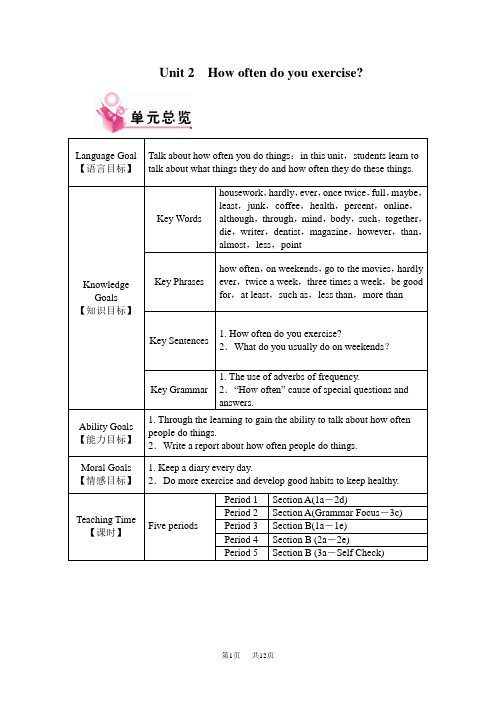
Unit 2How often do you exercise?本单元的教学内容围绕“多久做一次运动”这一话题展开。
Section A是基本语言内容的收集和学习,这一部分引导学生通过本课的语言素材进行看图说话、句型演练、实际描述,通过对话表演等使学生能够正确地使用表示做什么活动的词组,多久做一次的句型,从而熟练地谈论多久做一次活动。
Section B是知识的扩展和语言的综合运用,是在Section A的基础上,锻炼学生能够自如地谈论自己的生活习惯。
这些内容都是与学生日常生活紧密相关的,学生很熟悉,也乐于去说,因此在这一课题的教学过程中,应紧密联系学生生活实际,采用多种方式,以说为主,配合听的练习,最终以对话为途径,解决本课题的中心语句。
这易于引发学生学会运用简单的英语进行交际和交流,也对提高学生的综合能力,特别是说的能力很有帮助。
学生通过对本单元的学习,可以引导他们养成良好的生活习惯和饮食习惯,从而合理安排自己的各项工作,享受丰富多彩的校园生活。
第一课时Section A(1a-2d)Teaching Goals【教学目标】Key words:housework,hardly,ever,once,twice,Internet,program,full,swingKey phrases:how often,on weekends,go to the movies,help with housework,hardly ever,go shopping,once/twice a week/a month,swing danceKey sentences:1.What do you usually do on weekends?I often go to the movies.2.How often do you watch TV?I watch TV every day.Teaching Key Points【教学重点】The vocabulary:housework,hardly,ever,once,twice,how often,on weekends,go to the movies,go shopping,help with housework,once/twice/three times a week/a month Target language:What do you usually do on weekends?I often go to the movies. Does he go shopping?No,he never goes shopping. How often do you have piano lessons?Twice a week,on Wednesday and Friday.Teaching Difficult Points【教学难点】1.The adverbs of frequency:always,usually,often,sometimes,hardly ever,never2.Target language above.Teaching Aids【教学工具】An English textbook,a tape recorder,CAI or courseware.Teaching Steps【教学过程】★Step 1Leading in1.Greetings:Talk about something the students did on summer vacation.2.Check the homework.★Step 2Pre-taskPage 9,1a.1.Look at the picture.2.Name each activity.T:What are they doing?S:They are shopping/reading/exercising/watching TV/helping with housework.(Help the students to answer.)3.Write the activities on the line.4.Check the answers on the board.5.Practice reading.Page 9,1c.1.Focus on the conversation in the box.2.Practice reading.3.Pair-work:What do you do on weekends?I...4.Group-work:Divide the class into groups of four or five. Make conversations. First S1 to S2:S1:What do you do on weekends?S2:I...S1:What does she/he do on weekends?S2:She/He...5.Act out their own dialogues.★Step 3While-taskPage 9,1b.1.Look at each picture above 1a.Tell what the person does on weekends. Check the Ss orally.2.Make sure what they will hear and do.3.Read these adverbs and explain.4.Play the tape twice. Write the letters on the line.Page 10,2a & 2b.1.Read the activities and the answers of “how often” first.2.Practice reading.3.In 2a we should know the activities you hear. In 2b we should know the answers of how often he does the activities.4.Play the tape for the first time. Ss only listen.5.Play the tape a second time. Ss do 2a.6.Play the tape a third time. Check the answers.7.Play the tape. Ss do 2b.8.Check the answers.In this part,we should pay attention to “how often” cause of special questions and answers.★Step 4Post-taskPage 10,2c & 2d.1.Focus on the conversation in 2c first.2.Practice reading.3.Read the activities in the left box.4.Fill in the chart.5.Pair-work:Make conversations.6.Make students scan the conversation in 2d.7.Teach and then make Ss role-play the conversation in pairs. In this part,student A will be Jack. Student B will be Claire. As they talk,move around to monitortheir work. Offer language or pronunciation support as needed.8.Have a group of students present their conversation to the class.★Step 5Homework1.Practice the conversation in 2d.2.Do the exercises on Page 8 in students' book.Board Design板书设计Unit 2How often do you exercise?The first period Section A(1a-2d)1.Key vocabulary:housework,once,twice,full,how often,on weekends,go to the movies,help with housework,hardly ever,once a week,three times a month 2.表示动作的频率由高到低依次是always(100%),usually(80%),often(30%~50%),sometimes(20%),hardly ever(5%),never(0%)。
人教新目标英语八年级上册Unit2SectionA2d3c课时教学设计

1.教学内容:
-通过故事或情景剧的形式,呈现本课主要句型和词汇,如"My dream is to be a...", "I work hard to achieve my dream"等;
-结合课文的语境,讲解一般现在时和一般过去时的区别和用法。
2.教学过程:
-教师以生动的语言和丰富的表情,为学生讲解新词汇和句型的用法;
1.写作任务:
-请学生撰写一篇关于自己梦想的短文,要求运用本节课所学的句型和词汇,如"My dream is to be a...", "I work hard to achieve my dream"等;
-短文内容需包括自己的梦想、为实现梦想所做的努力以及未来的计划;
-教师将根据学生的写作成果给予评价和指导。
4.提高听力理解能力,能够理解并获取课文和听力材料中的关键信息;
5.提高口语表达能力,能够就自己的目标和梦想进行简单的陈述和讨论。
(二)过程与方法
在本课时教学中,教师将采用以下过程与方法:
1.创设情境:教师通过展示图片、视频等资源,引导学生谈论自己的目标和梦想,激发学生的兴趣和参与意识;
2.任务型教学:教师设计各种任务,如小组讨论、角色扮演、听力练习等,让学生在实践中掌握语言知识;
3.课堂活动:
-设计小组讨论活动,让学生相互询问和分享彼此的梦想和目标;
-开展角色扮演,让学生模拟真实的语言环境,运用所学句型和词汇进行交流;
-安排听力练习,提高学生的听力技巧,同时加强对课文内容的理解。
4.语法讲解与实践:
-采用对比法讲解一般现在时和一般过去时的区别,通过实例和练习加深学生的理解;
人教新目标八年级英语上册教案Unit2Howoftendoyo

精品基础教育教学资料,请参考使用,祝你取得好成绩!Unit 2 How often do you exercise?Section A (1a-1c)一、教学目标1.Knowledge objects.(知识目标)Name of activities.Adverbs of frequency.What do you usually do on weekends?I often go to the movies.2.Ability objects.(活动目标)Writing skill.Listening skill.Communicative competence3.Moral object.(情感目标)Keep a diary every day in English.二、教学重点1. Words: exercise, skateboard, hardly, ever,2. Phrases: how often, on weekends, go to the movies, exercise, go skateboarding, always, usually, often , never , hardly ever , sometimes .3. Sentence: What does she /he do on weekends? She often goes to the movies.三、教学难点1. Watching TV, reading, shopping skateboarding, exercising2. Always, usually, often, sometimes, hardly ever, never3. What does she do on weekends?She often goes to the movies.四、教学过程Step 1 GreetingSummer vacation is over. I think you had a wonderful vacation, am I right? Did you enjoy your summer vacation? Could you please tell us what you did in your summer vacation?2. Encourage students to share their holidays with the whole class.Step 2 Leading – inOh, you had a happy and colorful vacation. Today we will talk about more activities on weekends. First, let’s think about what we can do on weekends. I often sing on weekends, what do you usually do on weekends? What does she usually do on weekends? What about you? What does he usually do on weekends? (Ask more students in the same way)Step 3 1aLook at the screen. Make a list of the different weekend activities. Now work in pairs, ask and answer.---What does he/she do on weekends?--- She goes shopping. / She reads books. / He exercises. / He watches TV. / She goes skateboarding.Step 4 1bListen and write the letters from the picture above on the lines below.Get students to focus on the six adverbs in activity 1b and help students to understand:Always-100% usually- 90% often-80% sometimes-50% hardly ever-10% never-0%Step 5 1cFirst ask two students to read the sample in speech bubbles.What do you usually do on weekends?I often go to the movies.Step 6 SummaryThis class we’ve learnt some names of activities: watching TV, reading, skateboarding, exercising, and shopping. And we also leant some adverbs of frequency: always, usually, often, sometimes, hardly, ever, never.Step 7 Homework:1. Memories the adverb of frequency2. Make conversations with “what do you do…”Section A (2a-grammar focus)一、教学目标1. Knowledge objects.(知识目标)Name of activities.Adverbs of frequency.How often do you watch TV?I watch TV every day.What’s your favorite program?It’s Animal World.2. Ability objects(活动目标)Writing skill.Listening skill.Communicative competence3. Moral object(情感目标)Keep a diary every day in English.二、教学重点1. Words: once, twice, time, surf, Internet, program2. Phrases: Every day, once a week, twice a week, three times a week, once a month, twice a month, watch TV, surf the Internet, read English books, go to the movies3. Sentence:How often do you watch TV?I watch TV every day.What’s your favorite program?It’s Animal World.三、教学难点1. Every day, once a week, twice a week, three times a week, once a month, twicea month.2. Watch TV, surf the Internet, read English books, go to the movies.3. How often do you watch TV?I watch TV every day.What’s your favorite program?It’s Animal World.四、教学过程Step 1 GreetingGreet the class and check the homework.Step 2 RevisionWhat do you usually do on weekends?What does he/she usually do on weekends?How often do you do that?Step 3 Teach the new wordsStep 4 Lead-in1. I always read English books on weekends.I usually exercise on weekends.I often go to visit my grandparents.I sometimes go shopping on weekends.I hardly ever play computer games on weekends.I never play cards on weekends.What does your English teacher do on weekends?2. I exercise every day. I go shopping once a week. I watch TV twice a week. I go dancing t hree times a month…How often does your English teacher exercise/ go shopping / watch TV / go dancing? Step 5 2aListen. Cheng is talking about how often he does different activities. Number the activities you hear (1-5).Check the answers.Step 6 2bListen again. How often does Cheng do the activities above? Match his activities with the number of the times he does them.Check the answers.Step 7 2cHow often do you do these activities?Fill in the chart and make conversations.Learn these activities: watch TV, surf the Internet, read English books, go to the movies, exercise.Ask: How often do you …E.g. How often do you watch TV?I watch TV every day.What’s your favorite program?It’s Animal World.How often do you watch t?Every day.Step 8 Grammar focusAsk some one to read and translate it.Complete 3a & 3b, then check the answers.Find of the best student. Complete 3c.Step 9 Summary and homework1. Do exercises on pages 1-2 of the workbook to practice the language presented in this unit.2. Remember what we learn today.3. Write a passage about what you often do on weekends and how often you do different activities.Section B一、教学目标1. Knowledge objects(知识目标)New wordsHow often do you drink milk, Liu Fang?I drink milk every day.Do you like it?No. But my mother wants me to drink it. She says it’s good for my health.2. Ability objects(活动目标)Writing skill.Listening skill.Communicative competence3. Moral object(情感目标)Help them with how to keep healthy.二、教学重点1. Words: Junk, food, milk, fruit, vegetables, sleep, interviewer, healthy2. Sentences:-How often do you drink milk?-I drink milk every day.-How often do you exercise?-I exercise every day.-How many hours do you sleep every night?-Nine.三、教学难点Listening:-How often do you drink milk?-I drink milk every day.-How often do you exercise?-I exercise every day.-How many hours do you sleep every night?-Nine.四、教学过程Step 1 GreetingGreet the class and check the homework.Step 2 wordsShow the new words on the screen and teach the new words. Ask students to repeat them. And make sure everyone knows the meanings.Step 3 Section B 1aNow open your books at page 12. Look at Activity 1a.First I’ll read each word. Please read after me.Junk food/Milk/Fruit/Vegetables/SleepThere are vegetables on the plate.Step 4 1b Pair workAsk some pairs to present some questions and answer to the class.Step 5 1cNow you’ll hear a reporter interview two people. Tina and Bill.Play the recording the first time. Students only listen. Then play it again. This time asks students to circle Yes, No or I don’t know.Step 6 1dFirst read the questions in the chart to the class.How often do you exercise?How often do you eat vegetables?How often do you eat fruit?How many hours do you sleep every night?How often do you drink?How often do you eat junk food?Check the answersStep 7 1e Pair workRead the sample in speech bubbles to the class first.Interviewer: How often do you exercise?Katrina: I exercise every day.Interviewer: And How of ten do you …?Step 8 Summary and HomeworkThis class we’ve leant some words and leant to interview somebody with the sentence, how often…? After class please give more practice.Step 9 2aComplete 2a.Find out how often the Ss do these activities.Read the article. 2b.Complete the pie charts on page 14.Step 11 2cRead the article again, and then complete the questions on 2c.Step 12 2dComplete 2d.Ss understand the difference of always, usually and sometimes.Step 12 2ePair work. Choose a new partner .Use the words in Activity 2e to make conversations. Share the students’ conversations.Step 13 3aNow you will rend the chart and complete the reporter on 3a.Check the answers.Read the article.Ask the Ss’ good habits and bad habits.Step 14 3bComplete 3b.Ss use the expressions like always, every day, twice a week and never.Step 15 3c3c. White a report about the Ss’ good and bad habits. They can use the report in 3a as an example.Step 16 4Take the health quiz in 4. Compare the results with the partner’s.Find out who is the healthiest in our class.Tell the Ss some information about how to become healthier.HomeworkWhite a report about your good and bad habits..Self Check1. Knowledge objects(知识目标)Vocabulary in this unit.Writing practice using the target language in this unit.2. Ability objects(活动目标)Writing skill.Communicative competence3. Moral object(情感目标)Keep a diary every day in English.二、教学重点Vocabulary in this unit.三、教学难点Writing practice using the target language in this unit.四、教学过程Step 1 GreetingGreet the class and check the homework.Step 2 Shelf Check 1Complete the chart. What about your parents? You can use these words: often every day usually always hardly ever neverStep 3 Shelf Check 2Write five sentences using the information above.Step 4 Shelf Check 3Complete the conversation.Step 5 HomeworkIf time doesn’t permit, leave some exercises of workbook as homewor k.。
人教新目标英语八年级上册Unit2全单元优秀教学案例
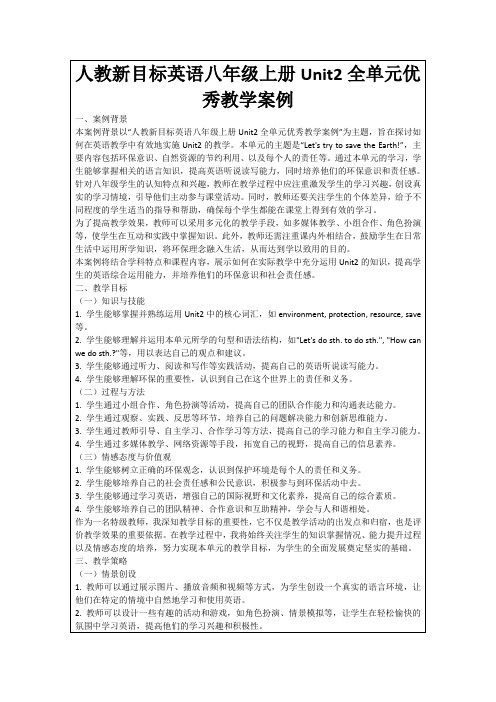
为了提高教学效果,教师可以采用多元化的教学手段,如多媒体教学、小组合作、角色扮演等,使学生在互动和实践中掌握知识。此外,教师还需注重课内外相结合,鼓励学生在日常生活中运用所学知识,将环保理念融入生活,从而达到学以致用的目的。
3.教师可以根据学生的学习表现和进步,给予适当的评价和反馈,激励他们持续学习和进步。
4.教师可以组织学生进行互评和小组评价,让他们在评价他人的过程中提高自己的沟通表达能力和批判性思维能力。
作为一名特级教师,我深知教学策略的重要性,它不仅是提高教学效果的关键,也是培养学生综合素质的有效途径。在教学过程中,我将根据学生的实际情况和需求,灵活运用各种教学策略,为学生的全面发展提供有力的支持和保障。
3.教师可以简要介绍本节课的学习目标和内容,让学生对即将学习的内容有一个清晰的认识和期待。
4.教师可以通过与学生互动的方式,如问答、讨论等,调动学生的学习积极性,营造一个活跃的课堂氛围。
(二)讲授新知
1.教师可以采用直接法,用英语介绍本节课的主要内容和知识点,如环保意识、自然资源的节约利用等。
2.教师可以通过举例、讲解、演示等方式,详细解释和说明本节课的核心概念和原理,让学生理解和掌握。
2.教师可以给予学生适当的指导和支持,帮助他们解决讨论过程中遇到的问题,促进他们的思考和表达。
3.教师可以鼓励学生分享自己的观点和看法,培养他们的沟通表达能力和团队合作能力。
4.教师可以对每个小组的讨论结果进行评价和反馈,给予他们鼓励和指导,提高他们的学习积极性和主动性。
人教新目标八年级英语上册教案Unit2Howoftendoyo
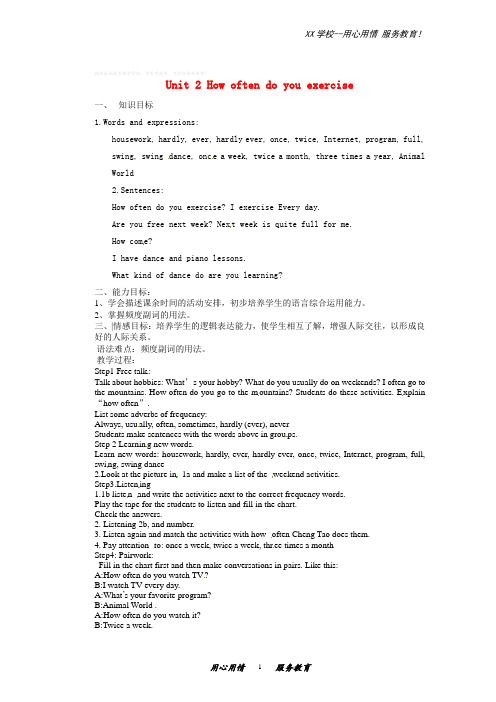
精品基础教育教学资料,请参考使用,祝你取得好成绩!Unit 2 How often do you exercise一、知识目标1.Words and expressions:housework, hardly, ever, hardly ever, once, twice, Internet, program, full, swing, swing dance, onc e a week, twice a month, three times a year, Animal World2.Sentences:How often do you exercise? I exercise Every day.Are you free next week? Nex t week is quite full for me.How com e?I have dance and piano lessons.What kind of dance do are you learning?二、能力目标:1、学会描述课余时间的活动安排,初步培养学生的语言综合运用能力。
2、掌握频度副词的用法。
三、|情感目标:培养学生的逻辑表达能力,使学生相互了解,增强人际交往,以形成良好的人际关系。
语法难点:频度副词的用法。
教学过程:Step1 Free talk:Talk about hobbies: What’s your hobby? What do you usually do on weekends? I often go to the mountains. How often do you go to the m ountains? Students do these activities. E xplain “how often”.List some adverbs of frequency:Always, usu ally, often, sometimes, hardly (ever), neverStudents make sentences with the words above in grou ps.Step 2 Learnin g new words.Learn new words: housework, hardly, ever, hardly ever, once, twice, Internet, program, full, swi ng, swing dance2.Look at the picture in1a and make a list of the weekend activities.Step3.Listen ing1.1b liste n and write the activities next to the correct frequency words.Play the tape for the students to listen and fill in the chart.Check the answers.2. Listening 2b, and number.3. Listen again and match the activities with how often Cheng Tao does them.4. Pay attention to: once a week, twice a week, thr ee times a monthStep4: Pairwork:Fill in the chart first and then make conversations in pairs. Like this:A:How often do you watch TV?B:I watch TV every day.A:What’s your favorite program?B:Animal World .A:How often do you watch it?B:Twice a week.Step5: Role-play1.Let the students read the conversation in 2d and m at ch the activity withthe right time.dance lesson ---------Mondaypiano lesson----------Wednesday and Fridayplay tennis------------Tuesday2.Pl ay the tape for the students to listen and repeat.3.Read by themselves an d find out difficulties.4.Exp lain some difficult points:(1)Next week is quite full for me.(2)How come?(3)I have dance and piano lessons.(4)What kind of dance do are you learning?5.Role-play the conversation in pairs.Step6 Summary1.Some adverbs of freque ncy : Always, usually, often, sometimes, hardly (ever),never2.Next week is quite full for me.3.How come?4.4.I have…lessons.5.What kind o f …6. use the internet7.three times a weekStep7 Test完成句子:1. --What do you usually do on w_________? --I often watch TV.2. --How often does she shop? --O_____ or t_____ a week.3. Grandpa is pretty healthy because he e_________ every day.4. Animal World is my favorite TV p___________.5. The weather here is so cold, I can h______ stand it.6. These two pictures have no __________(区别).7. ________ (虽然) Mr. White is very old, he goes to work every day.8. Do you have a ________(健康) lifestyle?9. The old man ________(锻炼) every morni ng.10. I often _______ (购物) on weekends.教学后记:。
最新人教版新目标八年级英语初二上册Unit2单元教案(5课时)
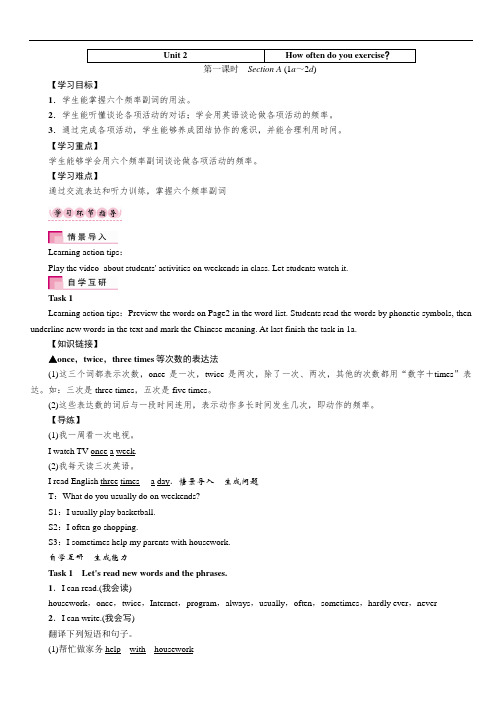
Unit 2 How often do you exercise?第一课时Section A (1a~2d)【学习目标】1.学生能掌握六个频率副词的用法。
2.学生能听懂谈论各项活动的对话;学会用英语谈论做各项活动的频率。
3.通过完成各项活动,学生能够养成团结协作的意识,并能合理利用时间。
【学习重点】学生能够学会用六个频率副词谈论做各项活动的频率。
【学习难点】通过交流表达和听力训练,掌握六个频率副词Learning action tips:Play the video about students' activities on weekends in class. Let students watch it.Task 1Learning action tips:Preview the words on Page2 in the word list. Students read the words by phonetic symbols, then underline new words in the text and mark the Chinese meaning. At last finish the task in 1a.【知识链接】▲once,twice,three times等次数的表达法(1)这三个词都表示次数,once是一次,twice是两次,除了一次、两次,其他的次数都用“数字+times”表达。
如:三次是three times,五次是five times。
(2)这些表达数的词后与一段时间连用,表示动作多长时间发生几次,即动作的频率。
【导练】(1)我一周看一次电视。
I watch TV once a week.(2)我每天读三次英语。
I read English three times__ a day.情景导入生成问题T:What do you usually do on weekends?S1:I usually play basketball.S2:I often go shopping.S3:I sometimes help my parents with housework.自学互研生成能力Task 1Let's read new words and the phrases.1.I can read.(我会读)housework,once,twice,Internet,program,always,usually,often,sometimes,hardly ever,never2.I can write.(我会写)翻译下列短语和句子。
Unit2教案人教新目标版(8上)
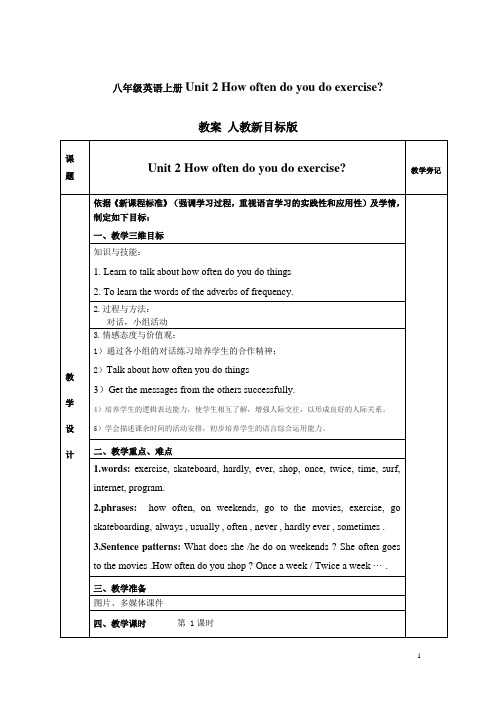
Unit 1
I always get up early.
I am never late for class.
I sleep nine hours every night.
always usually often hardly ever never
of course , pretty healthy/good ,unhealthy ,a healthy lifestyle, try to do sth..,
三、教学准备 图片、多媒体课件
四、教学课时
第 1 课时
1
五、教学过程
Step 1 :Greeting. 1.Welcome back: Talk about their holidays. 2.Encourage Ss to share their holidays with the whole class. Step 2 :Leading – in 1. Do you like watching TV? Yes ,I do.
How often does Cheng watch TV? He watches TV..
三、教学准备 图片、多媒体课件
四、教学课时
第 2 课时
4
五、教学过程
Step One :Greeting. Step Two :Leading – in Drills: T: What do you usually do on weekends ? S1: I usually play soccer . T: How often do you play soccer ? S1: I play soccer twice a week . T: How often does he play soccer ? The other Ss: He plays soccer twice a week . Repeat for three times . Step Three :Pre-task Review the grammar box . Step Four :While-task
【人教版】新目标八年级英语上册:Unit2单元教学设计
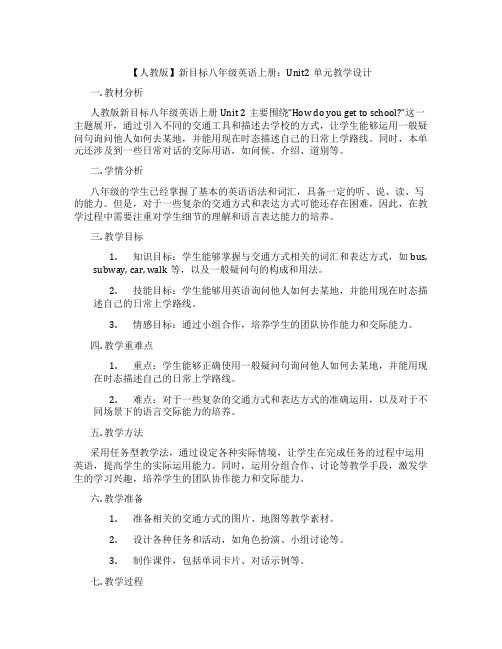
【人教版】新目标八年级英语上册:Unit2单元教学设计一. 教材分析人教版新目标八年级英语上册Unit 2主要围绕“How do you get to school?”这一主题展开,通过引入不同的交通工具和描述去学校的方式,让学生能够运用一般疑问句询问他人如何去某地,并能用现在时态描述自己的日常上学路线。
同时,本单元还涉及到一些日常对话的交际用语,如问候、介绍、道别等。
二. 学情分析八年级的学生已经掌握了基本的英语语法和词汇,具备一定的听、说、读、写的能力。
但是,对于一些复杂的交通方式和表达方式可能还存在困难,因此,在教学过程中需要注重对学生细节的理解和语言表达能力的培养。
三. 教学目标1.知识目标:学生能够掌握与交通方式相关的词汇和表达方式,如bus,subway, car, walk等,以及一般疑问句的构成和用法。
2.技能目标:学生能够用英语询问他人如何去某地,并能用现在时态描述自己的日常上学路线。
3.情感目标:通过小组合作,培养学生的团队协作能力和交际能力。
四. 教学重难点1.重点:学生能够正确使用一般疑问句询问他人如何去某地,并能用现在时态描述自己的日常上学路线。
2.难点:对于一些复杂的交通方式和表达方式的准确运用,以及对于不同场景下的语言交际能力的培养。
五. 教学方法采用任务型教学法,通过设定各种实际情境,让学生在完成任务的过程中运用英语,提高学生的实际运用能力。
同时,运用分组合作、讨论等教学手段,激发学生的学习兴趣,培养学生的团队协作能力和交际能力。
六. 教学准备1.准备相关的交通方式的图片、地图等教学素材。
2.设计各种任务和活动,如角色扮演、小组讨论等。
3.制作课件,包括单词卡片、对话示例等。
七. 教学过程1.导入(5分钟)利用图片和地图,引导学生谈论自己平时如何去学校,激发学生的学习兴趣。
2.呈现(10分钟)展示与本课主题相关的词汇和句型,如“How do you get to school?”和各种交通方式的词汇。
人教新目标英语八年级上册Unit2全单元教学设计

人教新目标英语八年级上册Unit 2 How often do you exercise?I. Teaching article: Unit TwoII. Teaching aims and demands:What do you usually do on weekends?I sometimes go to the beach.How often do you eat vegetables?Every day.Most of the students do homework every day.III. Teaching important and difficult points:Talk about how often you do things.IV. Teaching ways:Revision, Learning, Practice and Reading.V. Teaching tools:Tape-recorderV. Teaching time:Six periodsVI. Teaching procedure:The 1st periodStep 1 Greet the classT: I’ll introduce myself first. I’ll be your English teacher this term. Doyou like English? I hope we’ll get along very well. I’m not only your teac her, but can be your friends. We’ll be happy together. Now let’s begin. This class we’ll learn Unit2. How often do you exercise? Please open your books at page9.Step 2 Section A 1aFirst look at the picture. Ask a few students to say what they see in the thought bubbles. Each thought bubble shows something a person does on weekends.Then name each activity. Ask students to repeat each one.One girl is shopping.Another girl is reading.This boy is watching TV.The girl is helping with housework.Point out the sample answer. Then ask students to list all the activities in the thought bubbles. If they don’t know how to write the activities, use bilingual dictionaries.Then ask the students who finishes first to write the answers on the board.Check the answers on the board and ask students to correct their own activities.Step 3Display a large calendar that shows the days of the week. Tell studentsSaturday and Sunday are the weekend. Ask students to repeat Weekend. Then show these new words.How often always usually often sometimes hardly ever never Step 4 1c PairworkFirst ask two students to read the sample in speech bubbles.What do you usually do on weekends?I often go to the movies.Now work with a partner. Make your own conversations about the people in the picture. For example.Step 5 SummaryThis class we’ve learnt some names of activities: watching TV, reading, skateboarding, exercising, shopping. And we’ve also leant some adverbs of frequency: always, usually, often, sometimes, hardly, ever, never. Step 6 Homework:Keep a weekend dairy showing what you do on weekend. You can write down you do from the time you get up until you go to sleep.The 2nd periodStep 1 Greet the class.Step 2 Learn some new wordsStep 3 2aNow please look at the list of activities and read after me.Watch TV Exercise ---ReadStep 4 2bNow please look at the heading. How often? In the chart in Activity 2a. Ever day Once a week Twice a week Three times a weekOnce a month Twice a monthStep 5 2c PairworkFirst ask a student to read the list of activities to the class.Watch TV Surf the Internet Read English books Go to the movies ExerciseNow tell me how often do these activities. You can write your answers under the list of How often.Step 6 2dRole play the conversation and underline any difficult point.Lead Ss to read the conversation and explain some difficult ter,make their own conversations in pairs like the sample one.Step 7 Grammar FocusStep 8 Summary and HomeworkThis class we’ve leant some adverbs of frequency: every day, once a week, once a month, twice a month. And we’ve leant to talk about how often p eople do things. And also we’ve had a game.The 3rd periodStep 1 Greet the class and check the homework.Step 2 Show the new words on the screen and teach students how to read. And ask them to repeat.Step 3Now please open your books at page11. Look at 3a first. I’ll read each line to plete the questions with ‘do and does’.Then match the questions and st write questions with the words given, and ask and answer them with a partner.Finish 3b.Correct any mistakes.Step 4 3c Group workWhat can you do improve your English?Collect the answers on the blackboard. For exampleRead English books Sing English songs See English moviesHow often do you do the things?Step 5 An activityAsk students to talk about how often their family members do things. For example,My mother cooks dinner every day. We eat in a restaurant once a week. My father goes to the United States once a year.Step 6 SummaryThis class we’ve read a magazine article and done an exercise. I hope you can study hard and be good students. Your parents and teachers are proud of you.Step 7 HomeworkWrite a passage on how to improve your English.The 4th periodStep 1 Greet the class and check the homework.Step 2 Show the new words on the screen and teach the new words. Ask students to repeat them. And make sure everyone knows the meanings. Step 3 Section B 1aNow open your books at page12. Look at Activity 1a. First I’ll read each word. Junk food Milk Fruit Vegetables Sleep CoffeeThere are vegetables on the plate.Step 4 1b PairworkAsk some pairs to present some questions and answers to the class.Step 5 1cNow you’ll hear a r eporter interview two people. Tina and Bill.Play the recording the first time. Students only listen. Then play it again. This time ask students to circle Yes, No or I don’t know.Step 6 1dFirst read the questions in the chart to the class.How often do you exercise? How often do you eat vegetables?How often do you eat fruit? How many hours do you sleep every night? How often do you drink milk? How often do you eat junkfood?Listen and fill in the blanks.Check the answers.Step 7 1e PairworkRead the sample in speech bubbles to the class first.Interviewer: How often do you exercise?Tina: I exercise every day.Interviewer: And How often do you …?Step 8 Summary and HomeworkThis class we’ve leant some words and leant to interview somebody with the sentence, how often…?After class please give more practice.The 5th periodStep 1 Greet the class and check the homework.Step 2 Show the new words on the screen and teach them. Read the new words to students and ask them to repeat.Step 3 2aOpen your books at page 13. Look at Activity 2a.Read the instruction to the class.Explain the phrases and rank these activities.Check the answers.Step 4 2b This activity provides reading practiceusing the target language.Read the article and complete the pie charts.Ask students to work individually.Explain some language points and correct mistakes if any.Step 5 2cAsk students to have a quick look at the questions in 2c,then read the passage again and answer the questions.Correct mistakes if any. Then ask some students to read their answers to the class.Step 6 2dAsk Ss to read through the instruction,then do it individually.Check the answers and lead Ss to read the sentences,call attention to the pronunciation and tone.Step 7 2eFree talk Work in groups of five to ask each other how often they do free time activities.Fill the results in the chart and make a pie chart.Check the answers together.Step 8 Summary and HomeworkThis class we’ve learnt a lot. We know what healthy things are and unhealthy things are.Recite activity 2b.The 6th periodStep 1 Greet the class and check the homework.Step 2 Show the new words on the screen and teach them. Read the new words to students and ask them to repeat.Step 3 3aOpen your books at page 15. Look at Activities 3a. Look at the information in the chart and talk about whether they have these good /bad habits or plete the report and check the answers.Read the report and explain some language points.Step 4 3bComplete the chart with your own information.Ask students to work individually and talk about his or her ter, present their work,lead Ss to have a good habit.Step 5 3cAsk students to finish the writing individually. Then ask some students to read their paragraphs to the class.Lead Ss to tell good habits from bad habits.Step 6 4 SurveyTake the health quiz.Who is the healthiest?Questions.1. How often do you exercise?2. What sports do you play?3. How often do you eat vegetables?---Collect the results,choose the healthiest one.Step 7 Self Check 1and 2Complete the chart and make five sentences. Check the answers.Step 8 Self Check 3(for homework)Complete the conversation,check the answers.Then role play the conversation.Often every day usually three times a week sometimesonce a week always once a month hardly ever neverStep 9 SummaryThis class we’ve reviewed vocabulary a nd abverbs of requency in unit 2. And we’ve reviewed the target language in this unit and done some exercises.Step 6 HomeworkIf time doesn’t permit, leave some exercises of workbook as homework.。
人教新目标英语八年级上册unit2全单元教案
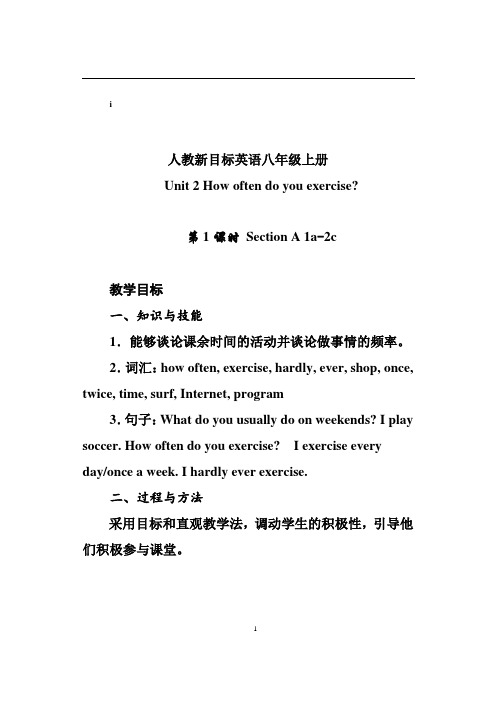
i人教新目标英语八年级上册Unit 2 How often do you exercise?第1课时Section A 1a-2c教学目标一、知识与技能1.能够谈论课余时间的活动并谈论做事情的频率。
2.词汇:how often, exercise, hardly, ever, shop, once, twice, time, surf, Internet, program3.句子:What do you usually do on weekends? I play soccer. How often do you exercise? I exercise everyday/once a week. I hardly ever exercise.二、过程与方法采用目标和直观教学法,调动学生的积极性,引导他们积极参与课堂。
1三、情感、态度与价值观通过了解同学的生活习惯,增进了解,加深友谊。
教学重点能运用What do yo do on weekends? How often do you watch TV?进行交际。
教学难点正确使用频度副词,准确表达自己的生活习惯。
教法导航课上引导学生积极参与课堂活动,老师少讲,鼓励学生多练。
学法导航发现法,动手法。
教学准备多媒体,卡片。
教学过程Step 1 GreetingsGreet the students as usual.Step 2 Lead in2Say: What do you often do on weekends? Great! I love reading, too. Look at this card. What does the boy often do on weekends? Yes, he watches TV.Step 3 Group workShow the students the picture in 1a and say: Guess. What are the children doing, S1?A good guess. S2, what do you think?I think so. Now please look at the picture carefully. Work in groups and make a list of the different weekend activities.Step 4 ListeningSay Well done! Do you often go shopping, girls? What about boys? So you hardly ever go shopping, right? Introduce the other words in this way: always, usually, often, sometimes, hardly ever, never. Now please look at 1b. S1, can you read them for us? S2, could you please tell me the meaning of each word? Quite good!Now we will listen to the tape and write the activities next to the correct frequency words. Ask some students to report their answers.3Step 5 Pair workL et’s look at 1c. S1 and S2 , could you read the conversation for us? Quite good. Let’s look at the picture again.S3, What does the girl often do on weekends? (The teacher points to a picture in the picture in 1a.) Quite good. Now please work in pairs and talk about the activities they do on weekends. After a few minutes, say OK! Which pair would like to do first? Please!Good. And this pair, please.Step 6 ListeningAsk: Do you watch TV,S1? How often do you watch TV? Maybe your answer is once a week or twice a week. Here, once means one time, twice means two times. OK. Now Look at 2a. Listen. Cheng Tao is talking about how often he does different activities. Number the activities you hear 1-5. Let’s begin. Have you gto the answer? Who can tell me the answer? Very good.Now we will listen again. How often does Cheng Tao do the activities above?Match his activities with the4number of times he does them. After listening, say: Please tell me the answer like this: Cheng Tao watches TV twice a week. Understand? Excellent!Step 7 PracticePlease look at the form in 2c. Here are some activities that we can do. How often do you do them? Write them down. S3 and S4, could you please read the conversation for us? Well done! Please work in pairs. Try to know how often your partner does those things and get more information. Stop here. Who would like to present your conversation to us?Step 8 HomeworkAsk What do you do on weekends? Could you write a short passage about it and about how often you do them? That is your homework after class.课堂作业I. 写出下列频率副词1. 总是____2. 通常____3. 经常____4. 有时____5. 几乎不____6. 从不____5II. 写出下列表示频率的副词短语1. 每天______2. 一周一次______3. 一周两次______4. 一周三次_______5. 一月一次_______6. 一月两次_______参考答案:I. 1. always 2. usually 3. often 4. sometimes 5. hardly ever 6. never II. 1. every day 2. once a week 3. twice a week 4. three times a week 5. once a month 6. twice a month教学反思本节课设计比较贴合学生的实际,每星期都过周末,学生们肯定有丰富多彩的活动,也对彼此的周末好奇,因此他们在富有情趣的交际中愉快主动地接受信息、加工信息、交流信息,所以本节课的目标在愉悦的课堂气氛中得到落实和巩固。
人教新目标八年级英语上册教案Unit2Howoftendoyo

福建省高级人民法院印发《福建法院在线调解工作规范》的通知文章属性•【制定机关】福建省高级人民法院•【公布日期】2020.10.09•【字号】闽高法〔2020〕78号•【施行日期】2020.10.09•【效力等级】地方司法文件•【时效性】现行有效•【主题分类】调解正文福建省高级人民法院印发《福建法院在线调解工作规范》的通知闽高法〔2020〕78号全省各级人民法院、厦门海事法院、平潭综合实验区人民法院、福州铁路运输法院,本院各部门:现将《福建法院在线调解工作规范》印发给你们,请结合实际认真贯彻执行。
执行中遇到的问题,请及时报告我院。
福建省高级人民法院2020年10月9日福建法院在线调解工作规范为进一步完善一站式多元解纷机制,规范在线调解工作,根据最高人民法院《关于人民法院进一步深化多元化纠纷解决机制改革的意见》《关于人民法院特邀调解的规定》《关于人民法院深化“分调裁审”机制改革的意见》《关于建设一站式多元解纷机制一站式诉讼服务中心的意见》等规定,结合我省法院在线调解工作实际,制定本规范。
一、总则第一条 [在线调解]在线调解是指与人民法院建立诉调对接关系的特邀调解组织、特邀调解员、法院专职调解员,通过在线调解平台开展的调解,是一种高效、便捷、实时的现代化矛盾纠纷解决方式。
第二条 [在线调解平台]本规范所称的“在线调解平台”,是指人民法院建设或认可的各类依托信息技术实现调解资源整合,具备远程音视频调解及录音录像、在线委派、委托调解、在线生成调解协议、在线申请司法确认等功能的网站、系统及其他信息化载体。
第三条 [平台对接]推动在线调解平台与其他部门、行业调解平台对接,实现信息互联互通、矛盾纠纷网上处理。
第四条 [基本原则]在线调解应当遵循下列原则:(一)自愿平等。
尊重当事人意志,平等对待当事人;(二)便捷高效。
提升诉讼服务,方便纠纷解决;(三)诚实信用。
如实陈述矛盾纠纷,不得进行虚假调解;(四)合法依规。
人教新目标八年级英语上册教案Unit2Howoftendoyo11
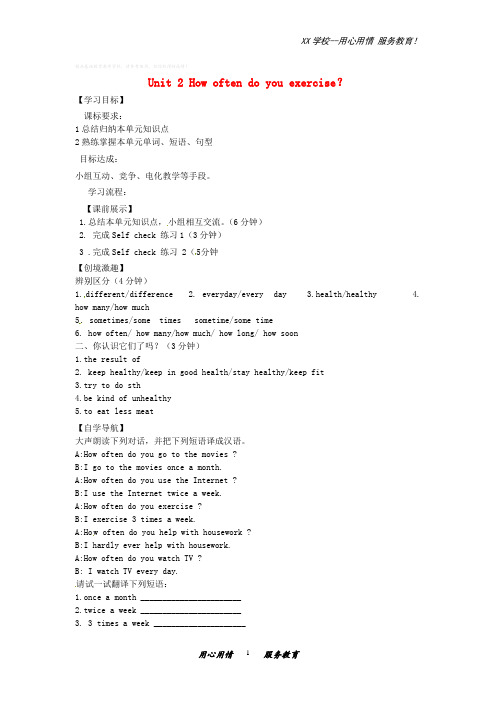
精品基础教育教学资料,请参考使用,祝你取得好成绩!Unit 2 How often do you exercise?【学习目标】课标要求:1总结归纳本单元知识点2熟练掌握本单元单词、短语、句型目标达成:小组互动、竞争、电化教学等手段。
学习流程:【课前展示】1.总结本单元知识点,小组相互交流。
(6分钟)2. 完成Self check 练习1(3分钟)3 .完成Self check 练习 2(5分钟【创境激趣】辨别区分(4分钟)1.different/difference2. everyday/every day3.health/healthy4. how many/how much5. sometimes/some times sometime/some time6. how often/ how many/how much/ how long/ how soon二、你认识它们了吗?(3分钟)1.the result of2. keep healthy/keep in good health/stay healthy/keep fit3.try to do sth4.be kind of unhealthy5.to eat less meat【自学导航】大声朗读下列对话,并把下列短语译成汉语。
A:How often do you go to the movies ?B:I go to the movies once a month.A:How often do you use the Internet ?B:I use the Internet twice a week.A:How often do you exercise ?B:I exercise 3 times a week.A:Ho w often do you help with housework ?B:I hardly ever help with housework.A:How often do you watch TV ?B: I watch TV every day.请试一试翻译下列短语:1.once a month _______________________2.twice a week _______________________3. 3 times a week _____________________4.hardly ever _________________________5.every day __________________________【合作探究】你还能写出多少?(5分钟)Example: go skateboardingGo_____________Go_____________go_____________go _____________go_____________go_____________go_____________go______________【展示提升】典例分析知识迁移用所给词的适当形式填空(3分钟)1.Good food and exercise help me to study ______(well).2.You must ______(try)_____(eat)_____(little) .3._____(eat) vegetables is good for our ______(health).4.He is pretty _____(health) because he _____(exercise) every day.5.They are ______(different).What are the _____(different) between them.句型转换(5分钟)1.Lucy usually cleans the room every two days.(画线提问)_____ ____ _____ Lucy usually clean the room?2.The little girl relaxes ten hours eve ry day. (画线提问)______ _____ does the little girl ____ every day ?3.His favorite sports is skateboarding.(同义句)He _____ skateboarding _____.4.The old man doesn’t want to eat anything. (同义句)The old man ______ to eat______.5.He does morning exercises every morning . (画线提问)_____ does he_____ every morning.【强化训练】根据汉语完成英语,每空一词。
人教版新目标八年级英语上册Unit-2--精品教案

Unit 2 How often do you exercise?( Book Ⅲ A )Teaching contents and analyzis本单元的教学内容围绕“多久做一次运动”这一话题展开。
Section A是基本语言内容的收集和学习,这一部分引导学生通过本课的语言素材进行看图说话、句型演练、实际描述,通过对话表演等使学生能够正确地使用表示做什么活动的词组,多久做一次的句型,从而熟练地谈论多久做一次活动。
Section B是知识的扩展和语言的综合运用,是在Section A的基础上,锻炼学生能够自如地谈论自己的生活习惯。
这些内容都与学生日常生活紧密相关的,因此在这一课题的教学中,应紧密联系学生生活实际,采用多种方式,引导学生学会运用简单的英语进行交际和交流,以提高学生的综合能力。
通过本单元的学习,我们可以引导他们养成良好的生活习惯和饮食习惯,从而合理安排自己的各项工作,享受丰富多彩的校园生活。
Teaching aims and demandsTeaching periodsPeriod 1 Section A(1a-2d)Teaching GoalsKey words:housework,hardly,ever,once,twice,Internet,program,full,swingKey phrases:how often,on weekends,go to the movies,help with housework,hardly ever,go shopping,once/twice a week/a month,swing danceKey sentences:1.What do you usually do on weekends?I often go to the movies.2.How often do you watch TV?I watch TV every day.Teaching Key PointsTarget language:--What do you usually do on weekends?--I often go to the movies.--Does he go shopping?---No,he never goes shopping.---How often do you have piano lessons?---Twice a week,on Wednesday and Friday.Teaching Difficult Points1.The adverbs of frequency:always,usually,often,sometimes,hardly ever,never2.Target language above.Teaching AidsAn English textbook,a tape recorder,CAI or courseware.Teaching Procedures★Step 1Leading in1.Greetings:Talk about something the students did on summer vacation.2.Check the homework.★Step 2Pre-taskPage 9,1a.1.Look at the picture.2.Name each activity.T:What are they doing?S:They are shopping/reading/exercising/watching TV/helping with housework. (Help the students to answer.)3.Write the activities on the line.4.Check the answers on the board.5.Practice reading.Page 9,1c.1.Focus on the conversation in the box.2.Practice reading.3.Pair-work:What do you do on weekends?I...4.Group-work:Divide the class into groups of four or five. Make conversations. First S1 to S2:S1:What do you do on weekends?S2:I...S1:What does she/he do on weekends?S2:She/He...5.Act out their own dialogues.★Step 3While-taskPage 9,1b.1.Look at each picture above 1a.Tell what the person does on weekends. Check the Ss orally.2.Make sure what they will hear and do.3.Read these adverbs and explain.4.Play the tape twice. Write the letters on the line.Page 10,2a & 2b.1.Read t he activities and the answers of “how often” first.2.Practice reading.3.In 2a we should know the activities you hear. In 2b we should know the answers of how often he does the activities.4.Play the tape for the first time. Ss only listen.5.Play the tape a second time. Ss do 2a.6.Play the tape a third time. Check the answers.7.Play the tape. Ss do 2b.8.Check the answers.In this part,we should pay attention to “how often” cause of special questions and answers.★Step 4Post-taskPage 10,2c & 2d.1.Focus on the conversation in 2c first.2.Practice reading.3.Read the activities in the left box.4.Fill in the chart.5.Pair-work:Make conversations.6.Make students scan the conversation in 2d.7.Teach and then make Ss role-play the conversation in pairs. In this part,student A will be Jack. Student B will be Claire. As they talk,move around to monitor their work. Offer language or pronunciation support as needed.8.Have a group of students present their conversation to the class.★Step 5Homework1.Practice the conversation in 2d.2.Do the exercises on Page 8 in students' book.Board DesignUnit 2How often do you exercise?The first period Section A(1a-2d)1.Key vocabulary:housework,once,twice,full,how often,on weekends,go to the movies,help with housework,hardly ever,once a week,three times a month2.表示动作的频率由高到低依次是always(100%),usually(80%),often(30%~50%),sometimes(20%),hardly ever(5%),never(0%)。
人教新目标八年级英语上册教案Unit2Howoftendoyo
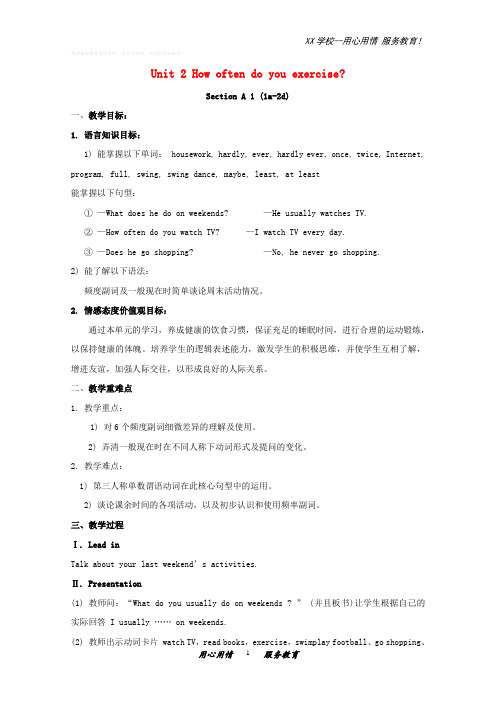
精品基础教育教学资料,请参考使用,祝你取得好成绩!Unit 2 How often do you exercise?Section A 1 (1a-2d)一、教学目标:1. 语言知识目标:1) 能掌握以下单词: housework, hardly, ever, hardly ever, once, twice, Internet, program, full, swing, swing dance, maybe, least, at least能掌握以下句型:① —What does he do on weekends? —He usually watches TV.② —How often do you watch TV? —I watch TV every day.③ —Does he go shopping? —No, he never go shopping.2) 能了解以下语法:频度副词及一般现在时简单谈论周末活动情况。
2. 情感态度价值观目标:通过本单元的学习,养成健康的饮食习惯,保证充足的睡眠时间,进行合理的运动锻炼,以保持健康的体魄。
培养学生的逻辑表述能力,激发学生的积极思维,并使学生互相了解,增进友谊,加强人际交往,以形成良好的人际关系。
二、教学重难点1. 教学重点:1) 对6个频度副词细微差异的理解及使用。
2) 弄清一般现在时在不同人称下动词形式及提问的变化。
2. 教学难点:1) 第三人称单数谓语动词在此核心句型中的运用。
2) 谈论课余时间的各项活动,以及初步认识和使用频率副词。
三、教学过程Ⅰ. Lead inTalk about your last weekend’s activities.Ⅱ. Presentation(1) 教师问:“What do you usually do on weekends ? ” (并且板书)让学生根据自己的实际回答I usually …… on weekends.(2) 教师出示动词卡片 watch TV,read books,exercise,swimplay football、go shopping、go to movies让学生回答。
山东省临沭县八年级英语上册《Unit 2 What’s the matter》教案 人教新目标版

Unit 2 What’s the matter ?主备人:时间:执教人:教学目标:(一)知识目标:熟练掌握重点词汇:matter, have a cold, stomachache, sore, back, arm, eye, foot, hand , head, leg, mouth, neck, nose, stomach, and so on.句型:学会用What’s the matter? I have a cold. I have a stomachache. I have a sore back. I have a sore throat来谈论身体情况。
(二)能力目标:Enable the students to talk about health problems and give advice with the language points.(三)情感目标:学习关心他人和照顾自己的健康教学重点:1.词汇:matter, have a cold, stomachache, sore, back, arm, eye, foot, hand , head, leg, mouth, neck, nose, stomach, tooth fever, toothache, rest, honey, dentist, should, headache, shouldn’t, ago, so, illness, advice. thirsty, stress, (be)stressed out, early, problem listen to music, traditional, believe, balance, weak, angry, tofu, medicine, western, everybody, get, few, a few, stay, important, balanced, diet, moment, at the moment, until, dear, host family, hear .2.句型:What’s the matter? I have a cold. I have a stomachache.I have a sore back. I have a sore throat. I’m not fe eling well.I hope you feel better soon.---What’s the matter with Gina? -----She’s tired. ……Drink some water. /Go to bed early3. 语法:情态动词should的用法1)should 常用来表示劝告、建议、认为某人应该做某事。
- 1、下载文档前请自行甄别文档内容的完整性,平台不提供额外的编辑、内容补充、找答案等附加服务。
- 2、"仅部分预览"的文档,不可在线预览部分如存在完整性等问题,可反馈申请退款(可完整预览的文档不适用该条件!)。
- 3、如文档侵犯您的权益,请联系客服反馈,我们会尽快为您处理(人工客服工作时间:9:00-18:30)。
山东省临沭县第三初级中学八年级英语上册《Unit2》教案人教新目标版教学目标:(一)知识目标:熟练掌握重点词汇:matter, have a cold, stomachache, sore, back, arm, eye, foot, hand , head, leg, mouth, neck, nose, stomach, and so on.句型:学会用What’s the matter? I have a cold. I have a stomachache. I have a sore back. I have a sore throat来谈论身体情况。
(二)能力目标:Enable the students to talk about health problems and give advice with the language points.(三)情感目标:学习关心他人和照顾自己的健康教学重点:1.词汇:matter, have a cold, stomachache, sore, back, arm, eye, foot, hand , head, leg, mouth, neck, nose, stomach, tooth fever, toothache, rest, honey, dentist, shou ld, headache, shouldn’t, ago, so, illness, advice. thirsty, stress, (be)stressed out, early, problem listen to music, traditional, believe, balance, weak, angry, tofu, medicine, western, everybody, get, few, a few, stay, important, balanced, diet, moment, at the moment, until, dear, host family, hear .2.句型:What’s the matter? I have a cold. I have a stomachache.I have a sore back. I have a sore throat. I’m not feeling well.I hope you feel better soon.---What’s the matter with Gina? -----She’s tired. ……Drink some water. /Go to bed early3. 语法:情态动词should的用法1)should 常用来表示劝告、建议、认为某人应该做某事。
2)should 本身不能单独作谓语,必须和动词原形连用。
should 没有人称和数的变化,其否定形式为shouldn’t.教学难点:How to talk abou t the health and give the advice .教学方法:1. Task-Based Language Teaching2. The cognitive approach3. The oral approach教学媒体:多媒体,录音机投影仪课时分配:Period 1: Section A (1a---Grammar)Period 2: Section A 3a---SectionA 4Period 3: Section B 1a--2cPeriod 4: Section B 3a---Self-check教学过程:Period 1Teaching procedures:Step 1 Leading in1. T: How many parts of the body can you name ?What’s this ? (head , mouth etc.)Today we’ll learn some parts of the body .2. This is my head. Oh ,I have a headache .Step 2 Pre-task1. Read the new words by the Ss first .2.Then check the Ss if they can read the new words by themselves correctly .ifthere i s a mistakes, correct .3.Practice reading the new words .Give them 6 minutes .4.Have a competition between boys and girls .Write the wor ds you remembered justnow on the blackboard .5.Page7, 1a. Do this part by the Ss first. Write the correct letter after the nameof each body part on the list.6.Check the answers.7.Play a game. All the Ss close your book ,we’ll have a instructor to say :Touchyour nose /head /right ear … .Let’s see which student do it correctly and quickly .First all the Ss do this game .Then have competitions between boys and girls .5 boys and 5girls to the front to do what the instructor said .if you are wrong ,please go back to your seats ,the last one who stands at the front is the winner .Step 3 While-taskSB Page 7, 1b .Listen and check the answers .SB Page 7,1c .Work in pairs and act out .SB Page 8, 2a .1.Point out the eight items in this activity .Read the item to the class .Ss repeat .2.There are different conversations .Listen carefully . people are talking abouthealth problems they have and getting advice .3.Match the problems with the advice .4.Play the tape twice .5.Check the answers .Step 4 Post-task(1)同桌之间设计一个医生与病人之间的对话.(2)用所给词的适当形式填空。
1. (eat) green food can help to keep you (health).2. If we want to have a healthy lifestyle, we must have a (balance) diet3. It’s very important for us (study) English well.4. You should (eat) less food (keep) thin.5. He has a (tooth) and has to see the dentist.Step 5 Homework1.Remember the name of your body part .2. Write conversations between the doctor and the patient .典题赏析:1.—How is your grandma?—He is not .A. feel wellB. feel goodC. feeling wellD. feeling good简析:形容词表示身体健康的,又是进行时,故选C.2.I’m really busy because I have homework to do at the moment.A. too muchB. too manyC. much tooD. many too简析too much 加不可数名词,too many 加名词复数.much too 加形容词或者副词,故应选C.3. He (be) a history teacher five years ago.简析:ago以前句子用一般过去时,故填was.教后反思:围绕教学目标,先引导学生结合学习和生活中的实际情况提出问题,然后老师先给出建议并引出新词,并且对新词进行机械操练和简单记忆并能够造句. 在学生能熟练掌握该部分并有较充足的语言储备时,我在此基础上及时引出讨论性的话题,让学生说出他们在成长期间遇到的各种各样的烦恼以及困惑,并且让大家相互帮助想办法来解决这些问题。
Period 2Teaching procedures :Step 1 Leading in1.Free talk .2.Revise playing the game .3.Practice reading the dialogues .Step 2 Pre-taskSB Page 8, 2b .1.Pay attention to the four pictures .Each of these pictures illustrates one ofthe conversations .2.Play the tape , write the missing words on the blank lines .3.Play the tape again and check the answers .4.Pairwork: Practice reading the dialogues in the pictures .Take turns having theproblem and giving the advice .5.Practice reading the dialogue in 2c, and make their own conversations . Step 3 While-task Act out the dialogues .Act out the dialogue. Ask some pairs to come to the front to act out their own dialo gues .Step 4 Post-task SB Page 9, Part 4.1.Read the instructions an d demonstrate what a “mime” is .2.Read the dialogue by the Ss .3.Ask a student to come to the front and mime an illness ,the other Ss guess whatthe illness is .4.Ask one student to give advice .5.Give several students an opportunity to come to the front and mime an illness . Step 5 Homework1.When you had some problems, please remember what the doctor said .2. Remember the new words .教后反思:本节课我提出一个很令我困惑的问题,让学生围绕这个问题进行讨论并给出合理性建议,这样的活动既能锻炼学生的课堂反应能力,又能增强口语表达能力,在进行的过程中,我惊喜的发现学生的想象力如此丰富,有的观点是老师也未曾想到的,尽管学生的英语词汇有限,但学生已在模仿的基础上试着去主动运用语言了,在学生遇到类似的困难时.我就集集体的力量,动员大家用浅显的语言来表达,进一步巩固了所学的语言内容.Period 3Teaching procedures :Step 1 Leading in1.Free talk .2.Play the game: One student mimes an illness , the other students guess the illnessand give advice .What’s the matter? Do you have a sore throat?Step 2 Pre-taskSB Page 10 ,1a .1.Lo ok at the picture .Point out the four new words and expressions .Say each wordand ask Ss to repeat .2.The first picture .Explain something about it using one of the four words andexpressions .3.Match the words with the pictures by the Ss .4.Check the answers .5.Practice reading and make sure the Ss understand the meaning of the words . Step 3 While-taskSB Page 10,1b .1.Read the four sentences ,Ss practice reading .2.Look at the picture and match each picture with advice.3.Check the answers .SB Page 10 ,2a & 2b .1.First ,make sure the Ss understand what they will hear .2.Then read the four names3.Listen and write the problems on the bland lines .If possible ,write what eachperson “should” and “shouldn’t” do for their problem.4.Check the answers .Step 4 Post-taskSB Page 10,2c .1.Ask two students to read the conversation to the class .2.Pairwork. Make conversations with your partner .3.Act out the conversations for the class .4.Write two dialogues in the exercise book .能力提升:用所给词的适当形式填空。
